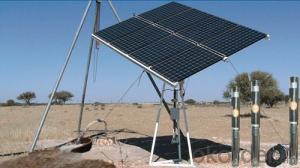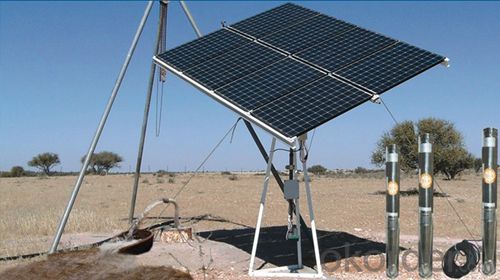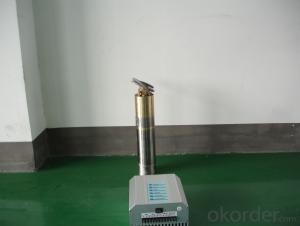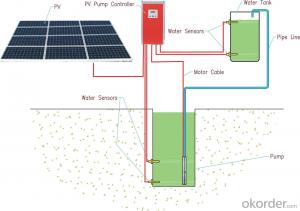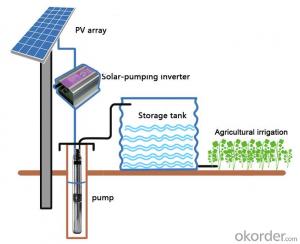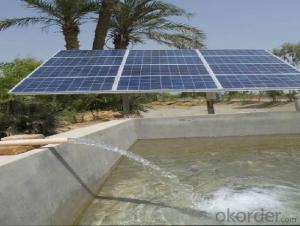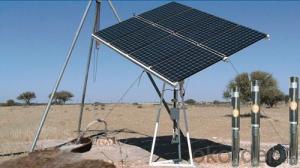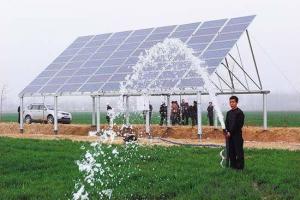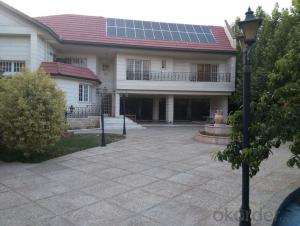Buy Solar Pump:Solar Powered Water Pump and Solar Water Heater Panels
- Loading Port:
- Shanghai
- Payment Terms:
- TT OR LC
- Min Order Qty:
- 1 set
- Supply Capability:
- 1000 set/month
OKorder Service Pledge
OKorder Financial Service
You Might Also Like
Solar Powered Water Pump Solar Water Heater Panels
DC solar water pumping system consists of the motor, pump, controller, solar array and some other accessories, such as water level sensor, float switch, etc. Considered that storing water is more efficient than storing electricity, the system is designed to directly drive the pump without battery which can reduce the construction and operating cost and routine maintenance effectively.The PV array consists of multiple solar panels connected in series/parallel, which can supply the whole system as power source by converting the absorbed solar radiation energy to the electrical energy. The pump driven by a brushless DC permanent magnet motor draws water from deep-well or river. The pumped water is then fed into reservoir or water tank, or connected to the irrigation system or fountain system directly.
Advanced Technology
Applications Innovation
The efficiency of DC brushless permanent magnet motor has been increased up to 25% in comparison with traditional asynchronous motor.
Technology Innovation
Stator and rotor are sealed by environment friendly casting resin.Motor insulation resistance can be hold higher than 300MΩfor more than 10 years, which consumedly increased the security and reliability of the submersible motor.
Structure Innovation
Casting resign technology processed stator and rotor as well as the water lubricated bearing make the submersible pump environment friendly.
Feature
High Efficiency & High Reliability
DC Brushless Permanent Magnet Motor
Minimum Maintenance, long Service Life
Environment Friendly Materials, Lubricated Without Oil
Application
Village or Family Water Supply
Animal Drinking Water & Livestock Watering
Garden/Courtyard Irrigation
Swimming Pool
Water Supply for Bivouac or Camping Car
Water Supply for Remote Area
Automatic Control
Operate Automatically, No Need Watching
Maximum Power Point Tracking (MPPT)
Dry-run Protection
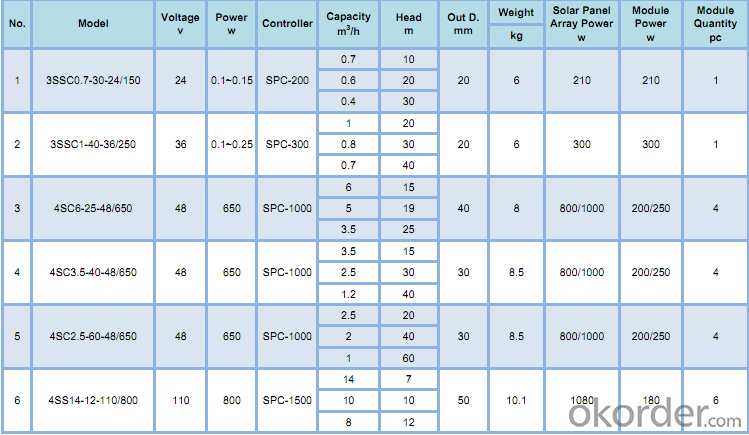
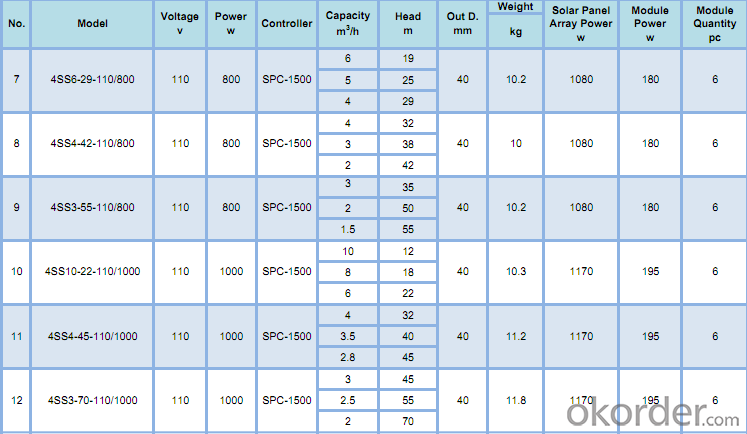
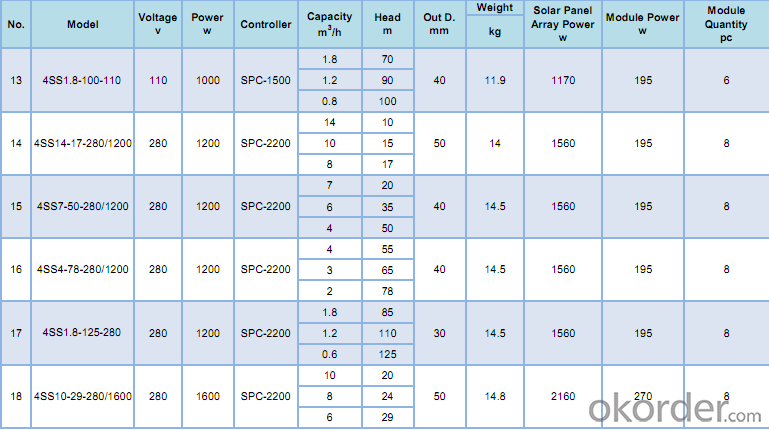
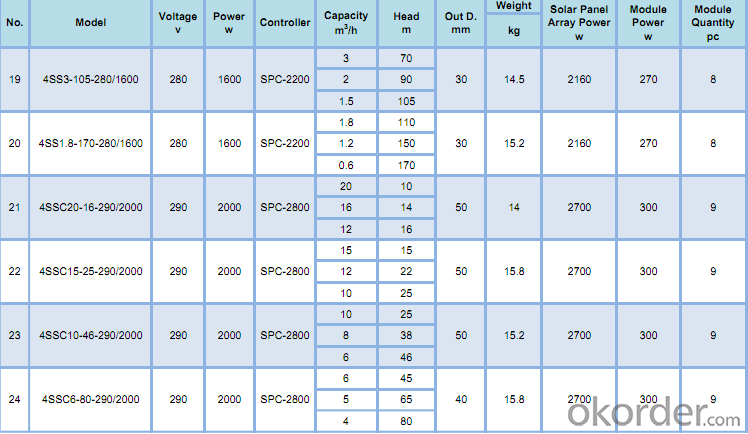
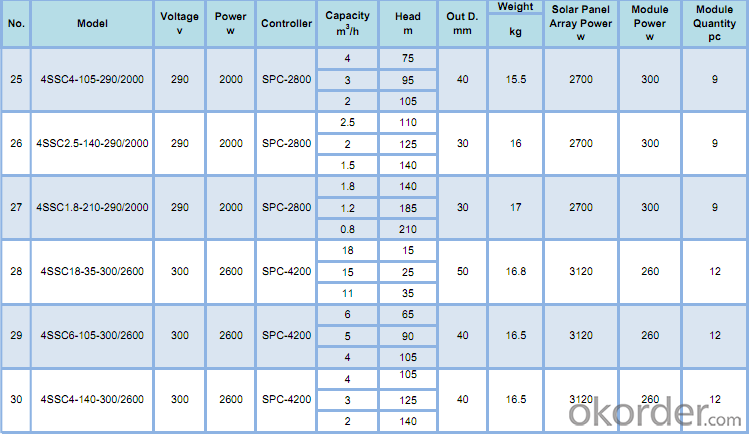
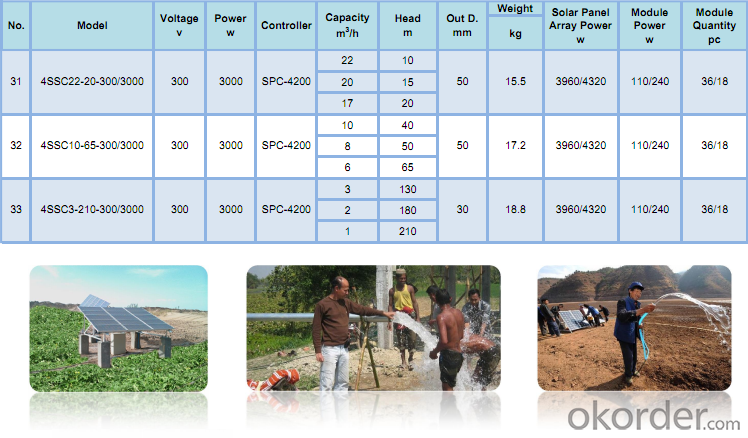
- Q: Can a solar pump be used for water circulation in hot tubs or spas?
- Yes, a solar pump can be used for water circulation in hot tubs or spas. Solar pumps are designed to circulate water using solar energy, making them an eco-friendly and cost-effective option for hot tubs or spas. They can help maintain water quality, prevent stagnation, and provide the necessary filtration and circulation required for a relaxing and enjoyable spa experience.
- Q: Can a solar pump be used in areas with salty or brackish water?
- Yes, solar pumps can be used in areas with salty or brackish water. The use of solar pumps in such areas requires the selection of appropriate materials and technologies that are resistant to corrosion caused by saltwater. Additionally, proper maintenance and regular cleaning of the pump components are essential to ensure optimal performance and longevity in these conditions.
- Q: How does a solar pump handle water with high levels of organic matter or decaying materials?
- A solar pump can effectively handle water with high levels of organic matter or decaying materials by using a filtration system. The pump is equipped with filters that can remove solid particles and debris from the water, preventing clogging or damage to the pump. Additionally, some solar pumps have self-cleaning mechanisms that help to prevent any build-up or blockage caused by organic matter.
- Q: Can a solar pump be used for water desalination?
- Yes, a solar pump can be used for water desalination. Solar pumps are powered by solar energy, converting sunlight into electrical energy to operate. Water desalination is the process of removing salt and other impurities from seawater or brackish water to make it suitable for drinking or irrigation purposes. Solar pumps can be used to extract water from the source, such as the ocean, and then feed it into a desalination system. Solar pumps offer several advantages for water desalination. Firstly, they are environmentally friendly as they do not generate greenhouse gas emissions or rely on fossil fuels. This makes them a sustainable solution for water desalination, especially in areas with abundant sunlight. Additionally, solar pumps are cost-effective in the long run, as they do not require fuel or electricity costs once installed. However, it is important to note that a solar pump alone cannot desalinate water. It is only responsible for pumping the water into a desalination system. The desalination process typically involves reverse osmosis or distillation, which require energy to operate. Solar pumps can be integrated with these desalination systems, where the solar energy generated by the pump can power the desalination process, making the entire system sustainable and self-sufficient. Overall, a solar pump can definitely be used for water desalination, but it needs to be combined with a desalination system that utilizes solar energy for the actual purification process. This combination can provide a reliable and sustainable solution for producing clean and drinkable water from seawater or brackish water sources.
- Q: Are there any limitations on the distance a solar pump can pump water?
- Yes, there are limitations on the distance a solar pump can pump water. The maximum pumping distance depends on various factors such as the power of the solar pump, the height the water needs to be lifted, the pipe diameter, and the efficiency of the system. Generally, solar pumps are capable of pumping water over distances ranging from a few meters to several kilometers. However, as the pumping distance increases, the efficiency and flow rate of the pump may decrease, and additional components like booster pumps or larger pipes may be required to maintain optimal performance.
- Q: On the issue of pumps and solar panels
- But the solar panels, then the general pump motor are AC, solar energy is the first DC output so the first to have an inverter, the other in order to ensure that no sun, such as night or cloudy can be used and to ensure that the inverter circuit voltage and current stability are by the solar panels
- Q: Can solar pumps be used for irrigation?
- Yes, solar pumps can certainly be used for irrigation. Solar-powered irrigation systems are increasingly being adopted as a sustainable and cost-effective solution for agricultural water needs. These pumps utilize energy from the sun to power water pumps, allowing farmers to efficiently irrigate their fields without relying on grid electricity or fuel-based generators. Solar pumps offer a reliable and eco-friendly alternative that can effectively meet irrigation requirements in areas with access to sunlight.
- Q: Can a solar pump be used for water supply in recreational facilities?
- Certainly! Solar pumps have the potential to serve as a water supply solution in recreational establishments. These pumps offer an outstanding alternative to conventional electric or diesel pumps since they harness solar energy to generate power. In addition to being cost-effective and eco-friendly, solar pumps can reliably provide water to various recreational facilities, including swimming pools, water parks, and sports fields. By effectively extracting water from wells, rivers, or other water sources and distributing it to the desired location, solar pumps prove to be an efficient choice. Their installation is hassle-free, and they require minimal maintenance, making them an optimal choice for water supply in recreational areas. Furthermore, solar pumps can be equipped with storage systems to ensure a constant water supply, even during cloudy days or at night. In summary, incorporating solar pumps for water supply in recreational facilities not only reduces operating expenses but also showcases a dedication to sustainable and clean energy solutions.
- Q: How do solar pumps compare to diesel or electric pumps in terms of efficiency?
- Solar pumps are highly efficient compared to diesel or electric pumps. Solar pumps utilize energy from the sun, making them cost-effective and environmentally friendly. They have lower operating costs, as they do not require fuel or electricity from the grid. Additionally, solar pumps have a longer lifespan and require less maintenance, resulting in higher overall efficiency.
- Q: Is there any noise generated by a solar pump system?
- Yes, there may be some noise generated by a solar pump system, but it is generally minimal. The noise level depends on the specific design and components of the system. Solar pumps usually use brushless DC motors, which are known to operate quietly. However, some noise may be produced due to the movement of water, vibrations from the pump, or other mechanical parts. Overall, the noise generated by a solar pump system is typically much quieter compared to traditional fuel-powered pumps or electric pumps.
Send your message to us
Buy Solar Pump:Solar Powered Water Pump and Solar Water Heater Panels
- Loading Port:
- Shanghai
- Payment Terms:
- TT OR LC
- Min Order Qty:
- 1 set
- Supply Capability:
- 1000 set/month
OKorder Service Pledge
OKorder Financial Service
Similar products
Hot products
Hot Searches
Related keywords
